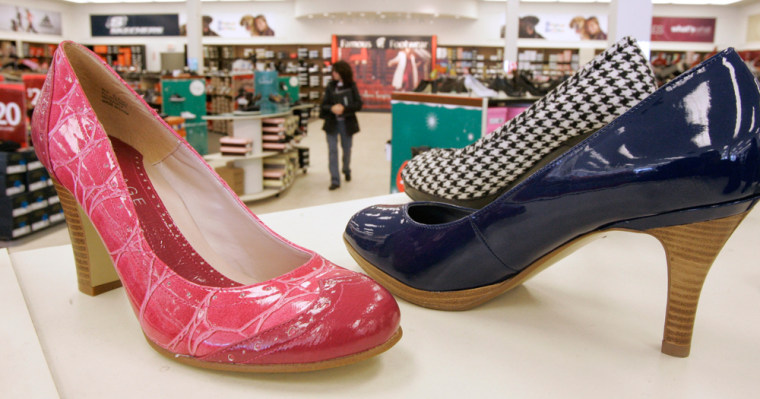Footwear makers and retailers are trying to stomp out a Depression-era U.S. government shoe tax, a move they say could save American consumers hundreds of millions of dollars annually and kick-start relatively flat footwear sales.
Trade associations and their members, such as Payless ShoeSource, Nike Inc., and Columbia Sportswear Co., have been lobbying U.S. lawmakers weekly since the summer to get them to exempt certain categories of footwear — including all children's shoes — from the import tariffs that can run as high as 67.5 percent a pair.
The groups created a Web site — EndtheShoeTax.org — to raise awareness and encourage constituents to tell their lawmakers, via an e-mail prompt on the site, to pass the Affordable Footwear Act of 2007.
While the matter appears to have widespread industry support, its relative obscurity and low-level priority make passage of the bill anything but a shoe-in, several supporters say.
Imposed in the 1930s, the tariffs were designed to protect a domestic manufacturing industry from cheap imports. But that industry has largely disappeared over the past 20 years, as manufacturing overseas has become easier and cheaper.
"It's an anachronism," Peter T. Mangione, president of the Footwear Distributors and Retailers of America, said of the tariffs. "It's just completely out of sync with what we need today."
Of the 2.4 billion pairs of shoes Americans bought in 2006, nearly 99 percent were made overseas, mostly in China, according to the American Apparel & Footwear Association.
U.S. shoe tariffs are among the highest in the world, compared with the European Union's 17 percent, Japan's 10 percent or Chile's six percent duties, according to the centrist Progressive Policy Institute.
Even those last-standing domestic shoemakers, represented by the Rubber and Plastic Footwear Manufacturers Association, and some companies, including privately held New Balance, which makes 25 percent of its products in the United States, support the bill.
"For the first time ever, we've got a united footwear industry," said Brad Figel, global director of government affairs for Beaverton, Ore.-based Nike.
By framing the issue as tax relief for consumers, the trade groups say it's gained a bipartisan foothold in Congress.
Reps. Joseph Crowley, D-N.Y., and Kevin Brady, R-Texas, on Oct. 23 introduced a House bill that repeals duties on certain footwear. It now has 61 co-sponsors. Senators Gordon Smith, R-Ore., Jim DeMint, R-S.C., and Maria Cantwell, D-Wash., introduced companion legislation in the Senate before Thanksgiving.
The proposed legislation won't repeal the duties entirely, but would eliminate some $800 million paid annually to the U.S. Treasury, which collected nearly $2 billion in 2006 just from shoe-import duties.
Any savings is significant, tariff critics say, because the biggest dent would be in low-cost footwear and all children's shoes — items most likely on the shopping list of lower-income families.
Kevin Burke, president of the American Apparel & Footwear Association, said, as an example, a high-end casual leather men's boat shoe that sells for $189.95, includes a 6.9 percent duty, or $13.13. But a pair of canvas casual shoe for a young girl, priced at $14.99, contains a 28.8 percent duty, or $4.32.
"That's ridiculous," said Burke, whose group spent $432,000 lobbying in the first six months this year on tariff legislation, according to a Senate disclosure form.
Crowley, who said the House Ways and Means Committee will likely hold a hearing on the matter early next year, said dealing with lost government revenue could become a problem, but added that savings to consumers could boost footwear sales.
"That in and of itself could help toward offsetting some of the loss that will be derived from the elimination of the tariffs," he said.
The shoe bill will likely be tied into a typically "contentious" general tax or trade bill — a pairing that could jeopardize its chances "even if this particular issue has no particular enemies," said Ed Gresser, Progressive Policy Institute's trade policy director.
The industry hopes the bill will be approved by the spring.
The $55 billion footwear industry is betting that lowering costs could help boost shoe sales, although many said it's too early to tell whether that would actually happen.
Matt Rubel, chief executive and president of Topeka, Kan.-based Collective Brands Inc., the holding company for the Stride Rite Corp., and Payless ShoeSource said the footwear market up until this year has "shown very, very moderate to slow growth," and doesn't show signs of picking up the pace.
Stopping short of hailing the repeal as an instant revenue booster for the industry, Rubel did say the savings for families with children would be significant.
"Why do we want to tax these people?" he asked.
